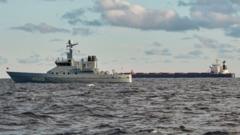Sweden's authorities have seized a vessel suspected of having damaged a data cable that runs beneath the Baltic Sea to Latvia, igniting concerns of sabotage. Prosecutors have indicated that the initial investigations suggest malicious intent, leading to the involvement of multiple agencies, including Sweden's police, military, and coast guard.
The incident comes on the heels of an increased military presence in the Baltic Sea, as previously reported by Latvia's military, which observed two vessels operating near the damaged area on the same weekend. This apparent attack is particularly noteworthy given that NATO had recently initiated its "Baltic Sentry" mission, aiming to safeguard submarine infrastructure in response to a series of underwater threats throughout the past year.
Latvia's Prime Minister Evika Selina has confirmed collaborative efforts between her government, Sweden, and NATO to address the sovereignty and security issues that have arisen. The damage pertains to a cable owned by Latvia's state broadcaster, LVRTC, which reported disturbances in data transmission services to their users but reassured that end users largely remained unaffected.
NATO's recent operations have involved the deployment of additional patrol aircraft, warships, and drones, aiming to enhance surveillance of the region amid increasing tensions with Russia. While NATO's Secretary-General Mark Rutte did not explicitly name Russia as responsible for the latest cable damage, he acknowledged concerns regarding Moscow and indicated that NATO would intensify its oversight of unregistered vessels upon which Russia is believed to rely for transporting restricted oil products.
The dialogue surrounding underwater infrastructure safety was further complicated by reports from Finnish law enforcement that were scrutinizing the potential involvement of a Russian vessel in the sabotage of an electricity cable connecting Finland and Estonia last year. In light of these developments, NATO's commitment to react firmly to future threats in the Baltic region is expected to resonate throughout the geopolitical landscape.





















